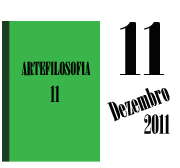Crítica cultural e sociedade unidimensional
Abstract
The cultural critique of “Frankfurt School”is not summed up to the cultural orartistic question neither can be considered as“pessimist”or“elitist”. Cultural critique concerns to the critique of culture as much as of society, in the same way Marx showed the relation between material production and spiritual reproduction of society. In thisway, Benjamin developed his criticism to the cinema, Adorno coined an expression “culture industry” and Marcuse “repressivede-sublimation”. Benjamin noted the affection of experience by new technologies of cultural reproduction. Adorno pointed out the regression of hearingin the phenomenon of music distribution, but this could be extended to the regression of the senses. Marcuse also developed the“loss”with the concept of “repressive de-sublimation” pointing to the one-dimensional society. The changes in contemporary society show the limits of Frankfurt School cultural criticism, but at the same time, show its relevance.
Downloads
References
ADORNO, Theodor W. O fetichismo na música e a regressão da audição 1936) In: BENJAMIN, W. et alii. Textos Escolhidos. Consultoria: P. Arantes. Trad. Luiz João Baraúna revista por João M. Coelho. 2ª ed. São Paulo, Abril Cultural, 1983. (Os Pensadores) pp. 165-191.
ADORNO, Theodor W. Crítica cultural e sociedade In: COHN, Gabriel (org.) Theodor W. Adorno. Trad. Flávio R. Kothe. São Paulo, Ática, 1986. pp. 76-91.
BENJAMIN, Walter. A obra de arte e sua reprodutibilidade técnica (1936)In: BENJAMIN, W. et alii. Textos Escolhidos. Consultoria: P. Arantes. Trad. José Lino Grünwald. 2ª ed. São Paulo, Abril Cultural, 1983. (Os Pensadores) pp. 3-28.
DUARTE, Rodrigo, Teoria crítica da indústria cultural. Belo Horizonte, Ed. UFMG, 2003.
HOBSBAWM, Eric J. A era do capital (1848-1875). Trad. Luciano Costa Neto. Rio de Janeiro, Paz e Terra, 1977.
HOBSBAWM, Eric J. A era das revoluções (1789-1848). Trad. Maria Tereza Lopes Teixeira e Marcos Penchel. 7ª ed. Rio de Janeiro, Paz e Terra, 1989.
HORKHEIMER, M. O eclipse da razão. Trad. Sebastião Uchoa Leite. Rio de Janeiro, Editorial Labor do Brasil, 1976.
HORKHEIMER, M.e ADORNO, T. W. Dialética do esclarecimento–Fragmentos filosóficos. Trad. Guido Antônio de Almeida. 3ª ed. Rio de Janeiro, Jorge Zahar Editor, 1985.
LUKÁCS, Georgy. História e consciência de classe -estudos da dialética marxista(1923). Trad. T. Costa. 2ª ed. Rio de Janeiro, Editora Elfos, 1989.
MARCUSE, Herbert. A obsolescência da psicanálise (1963) In: Cultura e sociedade. Wolfgang Leo Maar (org.) Trad. Isabel Maria Loureiro. São Paulo, Paz e Terra, 1998. pp. 91-111.
MARCUSE, Herbert. O caráter afirmativo da cultura (1936) In: Cultura e sociedade. Wolfgang Leo Maar (org.) Trad. Wolfgang Leo Maar. São Paulo, Paz e Terra, 1997. pp. 89-136.
MARCUSE, Herbert. Eros e civilização -uma interpretação filosófica de Freud (1955). Trad. A. Cabral. São Paulo, Círculo do Livro, s/d. [Eros and civilization -a philosophical inquiry into Freud (1955). New York, Vintage Books, 1963.]
MARCUSE, Herbert. A Ideologia da Sociedade Industrial (One-Dimensional Man). Trad. G. Rebuá. Rio de Janeiro, Zahar, 1967.[One-dimensional man. Studies in the Ideology of Advanced Industrial Society (1964). Intro. Douglas Kellner. 2ª ed. Boston, Beacon Press, 1991.]
MARCUSE, Herbert. Towards a critical theory of society. edited by Douglas Kellner. London, Routledge, 2001.(Collected papers of Herbert Marcuse; v. 2).
Copyright (c) 2017 Revista ArteFilosofia

This work is licensed under a Creative Commons Attribution-NonCommercial-ShareAlike 4.0 International License.
Autores que publicam nesta revista concordam com os seguintes termos:
- Autores/as mantém os direitos autorais e concedem à revista o direito de primeira publicação, com o trabalho simultaneamente licenciado sob a creativecommons.org/licenses/by-nc-sa/4.0/ que permite o compartilhamento do trabalho, com reconhecimento da autoria e publicação inicial nesta revista.
- Autores/as têm autorização para assumir contratos adicionais separadamente, para distribuição não-exclusiva da versão do trabalho publicada nesta revista (ex.: publicar em repositório institucional ou como capítulo de livro), com reconhecimento de autoria e publicação inicial nesta revista.


